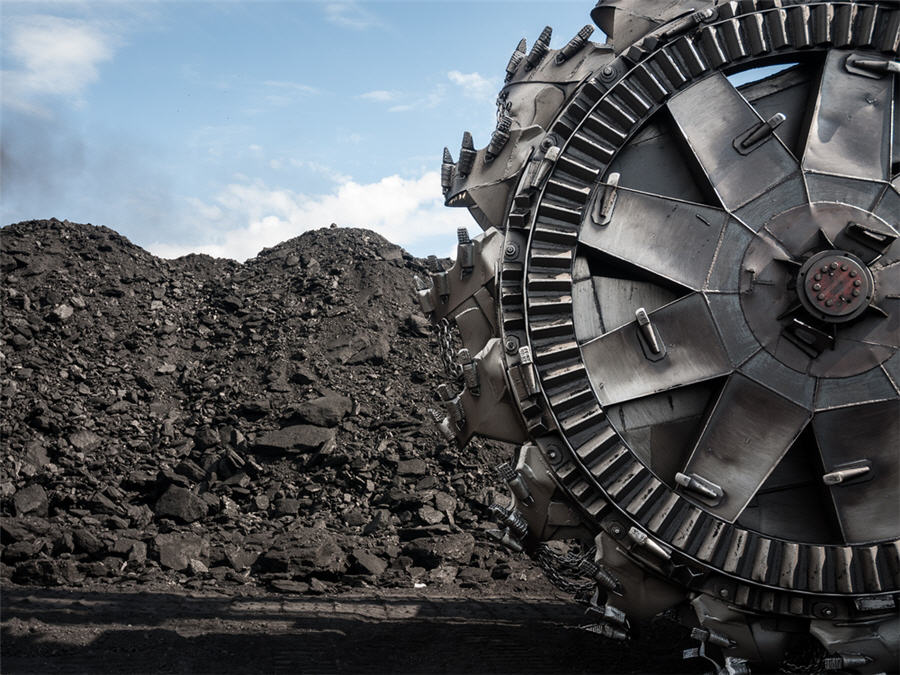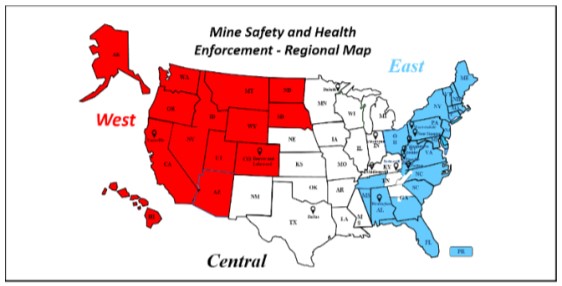Major MSHA reorg: New map shows three enforcement regions
 Stock image.
Stock image.
As part of its "Blurring the Lines" initiative, the Mine Safety and Health Administration (MSHA) is now implementing plans to dramatically change its internal organization for enforcement and has released a map showing the new hierarchy.
Before, individual coal and metal/non-metal districts reported directly to a coal or metal/non-metal administrator at headquarters in Arlington. Now, MSHA will divide the country into three regions, with each district (whether coal or metal/non-metal) reporting to a single regional administrator.
 Source: MSHA
Source: MSHAThegeographic regions will be Western, Central, and Eastern. In keeping with theBlurring initiative, each region will have a mix of both coal and M/NM mines.District managers will report to the region's regional administrator. In thenew scheme, districts will be re-named simply after the city where they arelocated (e.g., Warrendale).
While Tim Watkins willremain the national Administrator for Enforcement, his two deputies will nowbecome two of the three regional administrators. Brian Goepfert, currently thedeputy for M/NM enforcement, will move to Denver to be the Western RegionalAdministrator. Dave Weaver, currently the deputy for coal, will move to Dallasto be the Central Regional Administrator. MSHA currently has a job posting online tohire a third person as the Eastern Regional Administrator. It may appointsomeone to fill the slot temporarily in the interim.
While this changes theoversight above the district level, MSHA does not currently anticipate movingmore mines from one district to another after the changes made in the lastcouple years. There are currently 213 "cross-over" mines that have been movedacross the divide between coal and M/NM (coal mines overseen by ametal/non-metal district and vice versa).
There is no particulardate when the new regional structure will officially launch. Rather, it isrolling out continuously and gradually as various parts - especially the mapand the new regional administrators - fall into place.
Will it make adifference to most mine operators?
While this is a bigchange for MSHA's hierarchy, it remains to be seen whether it will have impactson the ground that are noticeable to the average mine in the normal course ofbusiness. In most enforcement matters, mine operators do not involve MSHApersonnel above the district office level. Moreover, having regionaladministrators closer to the districts could mean they are able to keep acloser eye on what takes place in the field. That could be helpful, especiallyin select areas where district management has struggled.
By contrast to thislatest regional change, other Blurring changes likely have had much moreday-to-day significance. The previous steps to move inspectors and districtsacross the divide between coal and metal/non-metal raised concerns that MSHAneeded to roll out significant training and orientation to be sure inspectorsand districts were familiar with the mines they are inspecting. Likewise, asthe coal industry has declined in activity, operators have seen surplus coal inspectorsbeing shifted to the metal/non-metal industry even though there has not beenany need for more inspection time at M/NM mines. As a result, some operatorshave reported seeing more inspectors spending more inspection time at theirfacilities though safety and health performance remains consistent.
Avi Meyerstein is a Washington, D.C.-based partner with the law firm Husch BlackwellLLP. He leads the firm's Safety & Health group.